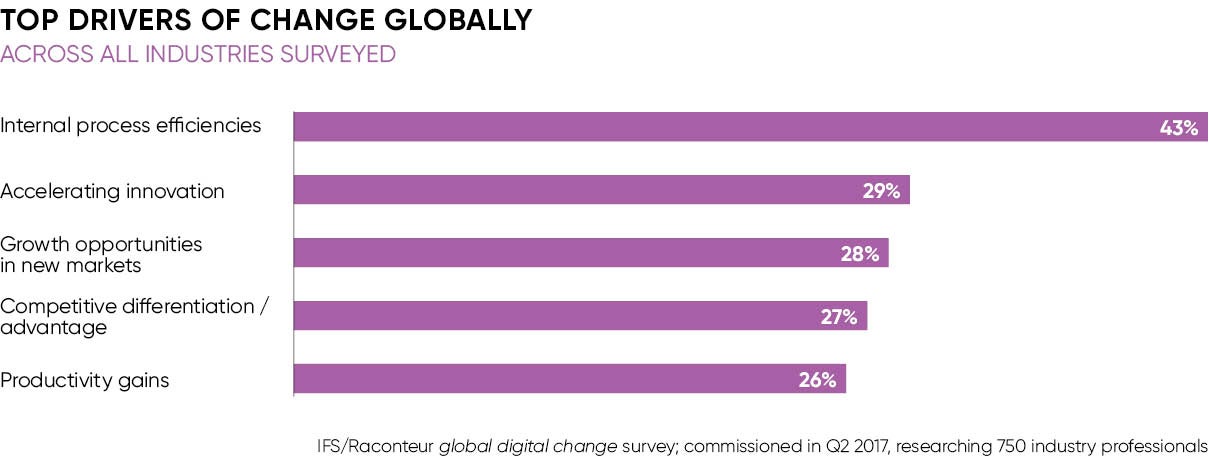 Things are good right now for manufacturers that export. While you shouldn’t change for change sake, I believe that it is easier to invest for the future when times are good. You only have to look at what’s happened in the oil and gas industries, and the thousands of jobs lost as a result of the market downturn.
Things are good right now for manufacturers that export. While you shouldn’t change for change sake, I believe that it is easier to invest for the future when times are good. You only have to look at what’s happened in the oil and gas industries, and the thousands of jobs lost as a result of the market downturn.
Nobody wants to see manufacturing go the same way and, when things do change, be it Brexit or exchange rates, we don’t want a reaction that inflicts damage on the industry. To secure the future of manufacturing, my advice is to embrace digital transformation now.
Earlier this year, a survey carried out by IFS and Raconteur of 750 companies revealed the number-one reason for adopting digital transformation is to improve internal efficiencies. This is always going to be one of the primary drivers of change. Another is to improve customer satisfaction and this is where the clever manufacturers are looking, at how they make their customers happier and give them compelling reasons to stay with them and continue to buy their products or services.
In the context of digital transformation they are finding ways to apply some of these new technologies to make their customers happier and build a long-term future for their company, regardless of what happens with Brexit or the exchange rate.
Fundamental to this is establishing an omnichannel support contact centre, from the customers’ point of view, effectively combining all the channels through which they voice their opinion, including their satisfaction, or lack of it, from e-mail to social media, into a single channel.
As well as the interactions they have with their direct customers, manufacturers must listen to and manage the chatter taking place in other areas. The way that consumers buy products is changing and, in increasingly digital world, manufacturing has to respond accordingly by using different technology to help listen to consumers and apply feedback to their products and services. Crucially, they must make that investment now while they have the opportunity.
Inevitably there will be challenges. A lot of manufacturers don’t fully understand the different technologies that are driving transformation – the internet of things (IoT), cloud, 3D printing, servitisation, augmented and virtual reality – and don’t know where to start. The scale of the transformation process can be overwhelming, so my advice to customers is to start with a small project and run it for a few weeks with a small team. Your aim is to win the trust and belief in what you are doing that you will need to take it to the board. Whether it is an IoT or servitisation project, by doing it on a small scale, on a single production line, you can assess the results and understand how it can be used to improve the business on a much larger scale.
To secure the future of manufacturing, my advice is to embrace digital transformation now
One IFS client, a furniture manufacturer, has really grasped this concept by adding cloud services to their offering. As a result, this very traditional manufacturer is now providing consultancy services, fitting out entire offices, by selling or offering for rent the furniture they produce. They made the effort to really understand what it was their customers were aiming to do. Consequently, they have moved up a gear and also moved the value their customers receive, away from purely the product they are making.
Another great example of a manufacturer using technology to engage customers more closely is a paint company that produces paint for ships’ hulls. By adopting IoT technology, they now introduce and can guarantee performance savings for their customers, by placing thousands of sensors on the hull, which generate data on drag as the vessel moves through the water. Based on this data, they can recommend the best time to repaint the hull to improve efficiency and guarantee a payback within 12 months.
They are no longer just selling paint; they are selling the capability to improve shipping performance. These things weren’t possible a few years ago. With the rise of the cloud and IoT they are a reality.
Servitisation is a way of securing long-term customer engagement. A company that we work with that manufactures hand-cleaning gels now makes and sells the gel dispensers. They now offer their customers a complete cleaning solution.

The principle in all these examples is that the manufacturer has clearly understood what the customer is trying to do with their product. If you are asking ‘how can this digital technology help me as a chair manufacturer?’ you are coming at it from the wrong direction. You need to look through your customers’ eyes, walk a mile in their shoes and see what are they trying to do? Work with your customers, help them achieve their objective and you’ll get that longevity of their loyalty.
Not all the new technology available today will be adopted by manufacturers, but nevertheless they must be innovative enough to show their customers what is possible. With its wealth of experience and industry knowledge IFS is working with manufacturing clients all over the world, helping them make that transition. We have the investment in technology and proof of concept, and want to share our experience and knowledge with manufacturers, and help them to secure a better and faster return on their investment.
Who knows what the next digital technology development will be for manufacturing? Robotics and automation have been around for some time, but how will they evolve? Progress has been fairly slow with 3D printing, but the aerospace industry is already starting to manufacture lighter or better components than those produced by conventional manufacturing processes.
The future of manufacturing rests on companies being more competitive, more efficient and more innovative. Will your company be around in the next five, ten or fifteen years? The answer to that will depend on how well you apply the digital technologies that are available to finding out what your customers want to do, almost before they themselves are absolutely clear about it – and delivering on it.
For more information please visit www.ifsworld.com/times, call 01494 428900 or e-mail info.uk@ifsworld.com


